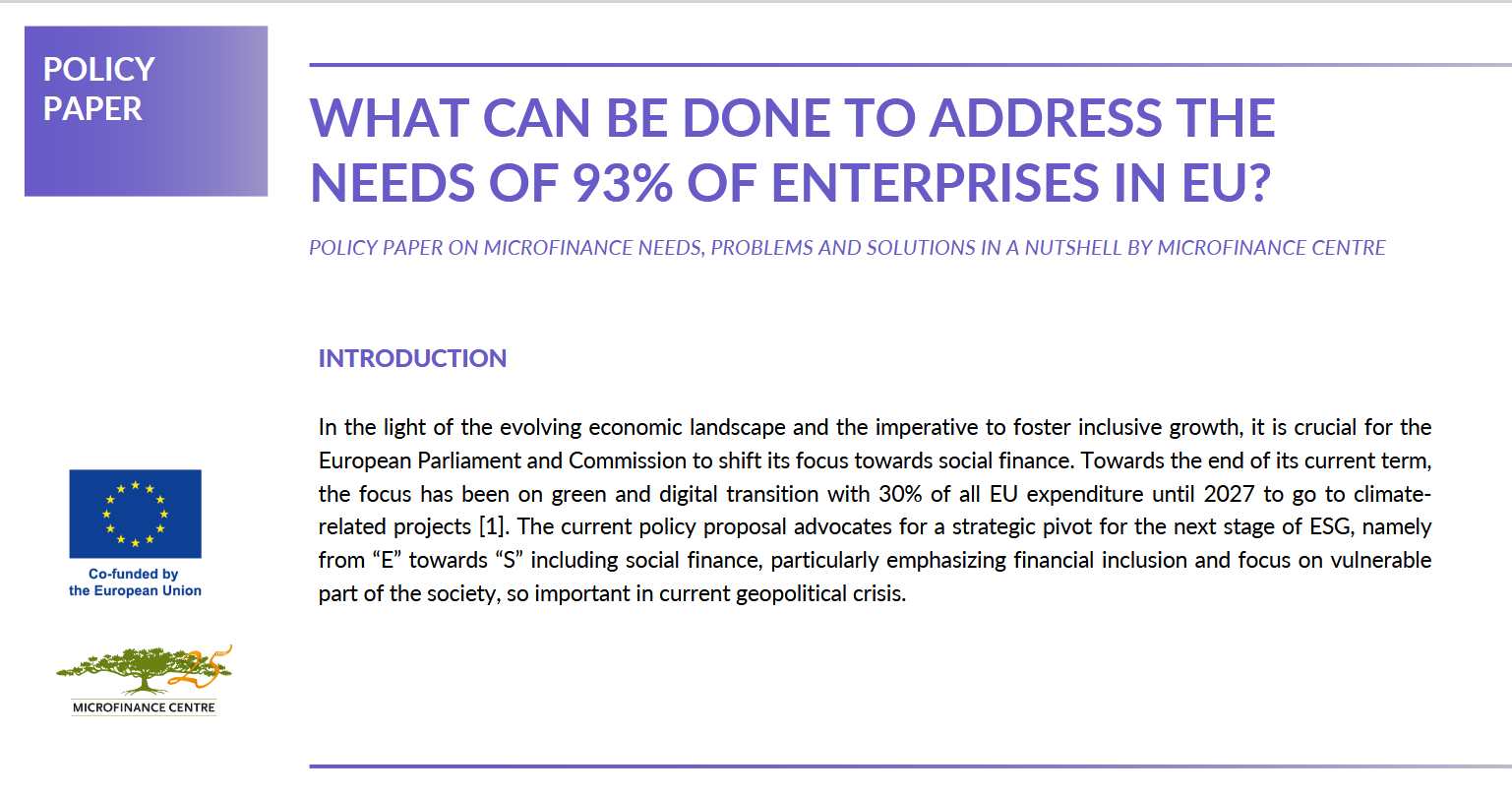What Can Be Done To Address The Needs Of 93% Of Enterprises In EU?

Between June and July last year, the Microfinance Centre (MFC) shared a policy paper with DG EMPL and CEB, highlighting critical funding challenges for microenterprises. This paper was developed with the collaboration and expertise exchange of members from our Partnership Action Group and provides key insights, reflections and recommendations.
Executive Summary
This policy paper calls for a strategic shift in EU policy towards social finance, with a particular focus on financial inclusion and vulnerable populations. It emphasizes the importance of microenterprises, which make up 93% of all EU companies, yet continue to face significant barriers to accessing affordable funding.
The paper identifies the main challenges hindering micro and social enterprises and proposes practical solutions aimed at:
✅ Securing dedicated funding at both EU and national levels
✅ Improving public funding instruments to enhance accessibility
✅ Enhancing coordination between EU institutions and Member States
✅ Reducing legal, financial, and regulatory barriers
Key Themes & Findings
🔹 Shifting Policy Focus
The paper urges the EU to expand its ESG priorities, shifting more focus from environmental (“E”) to social (“S”) finance, particularly in light of the current geopolitical and economic landscape.
🔹 The Role of Microenterprises
Microenterprises represent 93% of all EU businesses but generate a disproportionately small share of net turnover. They remain key employers, yet face ongoing financial barriers.
🔹 The Funding Gap
Traditional banks often overlook micro and social enterprises due to small loan sizes, lack of collateral, and high-risk weighting. The EU microfinance funding gap is estimated at €12.9 billion per year and is projected to grow.
🔹 The Need for Public Investment
Non-bank lenders are filling the gap but face higher funding costs compared to banks. Public funding participation is necessary to ensure affordable lending rates and financial inclusion.
🔹 Challenges with Current Public Finance Instruments
Existing EU funding mechanisms (InvestEU, EaSI, Progress) do not meet the full demand, and funding allocation often favors larger institutions, leaving smaller MFIs underserved.
🔹 Targeted Financial Instruments Are Lacking
Many current financial instruments serve both micro and small enterprises, creating competition between microlenders and commercial lenders, which limits funding access for microenterprises.
🔹 Barriers for Smaller MFIs
Complex application and reporting requirements favor larger MFIs, making it difficult for smaller institutions to access public funds.
🔹 Need for Better Coordination
While EU-level funding is cost-effective, national Managing Authorities have better local expertise. Lack of coordination between EU and national efforts weakens both cost and impact effectiveness.
🔹 Regulatory and Financial Barriers at the National Level
Micro and social finance institutions face legal and financial obstacles in many Member States, limiting their ability to support small businesses.
Proposed Solutions
🔹 Secure Adequate Funding for Microfinance both et EC and national levels
🔹 Dedicate Instruments just for Microenterprises
🔹 Establish a Separate Funding Pool for Smaller MFIs
🔹 Allocate a significant share of EU Shared Management Funds to microfinance and other social finance providers
🔹 Continuation and Enhancement of InvestEU Portfolio Guarantee Products
🔹 Using State Compartment to increase the InvestEU resources available for guarantees to micro and social enterprises
🔹 Provide of Low-Cost Funding Instruments
🔹 Simplify Application and Reporting Requirements
🔹 Standardize Reporting Requirements
🔹 Provide Funds for Innovation, Digitalization, and Green Transformation
Incorporate microfinance into current initiatives such as Social Climate Fund.
🔹 Enhance Coordination Between EC and Member States to allow for most effective approach for new funding opportunities
🔹 Encourage Managing Authorities to Include Microfinance in Operational Plans
🔹 Utilize Fi-Compass Platform for Advisory Services on EU shared management of financial instruments
🔹 Provide Business Development Services (BDS):
🔹 Promotion of Micro and Social Finance
Conclusion
The Microfinance Centre’s policy paper presents a compelling case for strengthening social finance in the EU, particularly in supporting micro and social enterprises. The paper outlines concrete, actionable solutions that policymakers can implement at both the EU and national levels to:
✔ Close funding gaps
✔ Simplify financial processes
✔ Enhance coordination
✔ Unlock inclusive economic growth
By addressing these barriers, the EU can better support microenterprises – ensuring job creation, financial inclusion, and long-term economic stability.
